Updated on 5/16/2025
What is Kinsta: A Review of Hosting and Deployment Features
 MS
MSMojtaba SeyediContent Writer
Feature |  Kinsta Kinsta | |
|---|---|---|
Infrastructure What runs under-the-hood. | Google Cloud, Cloudflare | |
Continuous Integration & Continuous Delivery (CI/CD) | ||
Continuous deployment Imagine an automatic update system for your website. This feature automatically deploys any changes you make to your code (usually from Git) to your live website. | ||
Automated builds from Git An easy integration with popular Git repository hostings like Github, GitLab and Bitbucket. | ||
Instant rollbacks to any version Easy way to promote any previous build to production without the need to revert commits or data changes. | ||
Site previews for every push New build with a unique URL for every commit and pull request. | ||
Compatible with all Static Site Generators | ||
Notifications Events triggered on successful, canceled, or failed build. | Email | |
Team Management Create team account and invite your teammates to the project. | ||
Custom domains Bring your own domain and connect to the project. | ||
Automatic HTTPS SSL certificate generated automatically. | ||
Rewrites & Redirects HTTP 301 or 302 redirects from one URL to another. Rewrites work similar to reverse proxy and allow to send user to different URL without modifying the original URL. | ||
Password Protection An easy way to restrict access to the website for users who don't have password. Useful if you work on a new site and want to keep it in secret. | ||
Skew Protection Skew Protection ensures client and server versions stay synchronized during deployments, preventing compatibility issues. | N/A | |
Free Tier | ||
Websites Number of projects you can have in Free Tier on one account. | 100 | |
Build Minutes The amount of time your build scripts can run per month. | 600 | |
Concurrent builds How many builds can be run at the same time? | 1 | |
Bandwidth The amount of data that is transferred to or from the CDN. | 100GB /month | |
Team Members The number of users (team members) that can be added to the CMS. | N/A | |
Build Time Per Deployment Build have to finish within the limited time. If not it will fail due to timeout. | N/A | |
Build Memory Limit (in MiB) The amount of memory that is allocated by system to build process. Some operations like image processing are expensive and might require more memory. For Node.js it is max-old-space-size setting. | 1024 MiB | |
Paid Plans | ||
Max team members before switch to custom pricing | N/A | |
Git contributors have to be Team Members In order to triger build, Git contributor has to be a paid team member. | ||
Serverless | ||
Serverless Functions (API) Small pieces of code that run on-demand without managing servers, typically used for API endpoints. | ||
Edge Functions Serverless functions that run closer to the user, reducing latency and improving performance. | ||
Background Functions Code that runs in the background on the platform to perform tasks that don't require immediate user interaction. | ||
CRON Jobs Schedule tasks to run automatically at specific times or intervals. Useful for automating repetitive website maintenance tasks. | ||
Developer Experience | ||
CLI Command Line Interface tools that allow developers to perform tasks and manage the tool via the command line. | ||
Extensions Additional plugins or add-ons that can enhance the functionality of the platform. | ||
Environment Variables Secret configuration settings for your website that change based on where it's deployed (dev, staging, production). | ||
Build Logs Track the progress and results of website builds for troubleshooting | ||
Build Canceling Ability to stop a build process that is currently running. This frees up resources and lets you make changes to your website faster by stopping builds you don't need anymore. | ||
Platform Built-in Products | ||
Analytics Tools for tracking and analyzing website traffic. | Server-side analytics. | |
Authentication Services for managing user logins and authentication. | N/A | |
Database Managed database services. | PostgreSQL | |
Asset Optimizations Tools for optimizing images, CSS, JS, etc. | bundling, minifying, compressing images | |
A/B Testing Lets you test different versions of your site by directing traffic to each variant, helping you optimize user experience based on performance metrics. | ||
Form Handling Services for managing form submissions. | ||
Data Storage Solutions for storing and managing data. | ||
Push Notifications This allows your website to send real-time alerts or updates to visitors who have opted-in. | ||
Machine Learning | ||
Security & Compliance Offerings | ||
Two-factor authentication Adds an extra layer of security when logging in. | ||
Team Logs Tracks user activity within the platform for better accountability. | ||
SOC2 Service Organization Control 2 compliance for managing customer data. | ||
ISO27001 International standard for information security management. | ||
GDPR Compliance with the General Data Protection Regulation for handling personal data. | ||
Sustainability | ||
Carbon Neutral | ||
Carbon-free Energy | ||
Integrations | ||
Integrations Connecting your deployment platform with external services like headless content, commerce, databases, and more. | ||
Custom build-system integrations Allows you to connect your own build tools and processes with the deployment platform. | ||
Support with self-hosted instances of git | ||
API mesh API Mesh allows you to combine multiple APIs into a single unified API, simplifying data fetching and integration across different services and backends. | ||
Deploy Preview feedback integrations Enables team members and stakeholders to comment directly on preview deployments. | N/A | |
Edge Functions integrations | N/A | |
High Performance Build Memory and CPU | N/A | |
Native Build Plugins | ||
What’s Kinsta?
Kinsta is a cloud platform designed to help companies and dev teams ship and manage their web projects faster and more efficiently. Although they started with managed WordPress hosting, now they've added Application Hosting and Database Hosting to their repertoire.
From WordPress hosting to application development platform
Kinsta, founded in 2013 by a group of WordPress experts, started out by offering managed WordPress hosting solutions. However, recently they realized the limitations of their platform for hosting non-WordPress projects. To make their customers' lives easier, Kinsta introduced Application Hosting.
With Kinsta's Application Hosting, you don't have to worry about setting up containers, managing servers, or dealing with technical complexities. They take care of setting up containers, managing servers, worrying about the OS, managing backups, and installing SSL certificates, allowing you to focus solely on development. It's a Platform-as-a-Service (PaaS) solution that simplifies the work of modern web developers.
With Kinsta's Application Hosting, you can deploy applications directly from source code onto their infrastructure. You can choose from popular Git service providers like Bitbucket, GitHub, and GitLab. The platform supports a wide range of languages, including Node.js, Ruby, Python, Java, Scala, PHP, and Go. Kinsta also provides Quick Start Examples for these languages, offering guidance on deployment and demonstrating tasks like sending emails using PHP or Node.js.
Is Kinsta good for Jamstack?
Yes, Kinsta supports Jamstack, although they are still in the early stages and don't offer extensive features specifically tailored to Jamstack development. However, they do provide automatic deployment whenever you push your code to GitHub, making the development process smoother.
Cloudflare powers Kinsta's CDN and Edge Caching. However, it's important to note that Kinsta does not currently have Cloudflare CDN or caching functionality built into their application hosting. Nevertheless, it is on their roadmap for future development.
To assist Jamstack developers, Kinsta offers example GitHub repositories and quick start guides for frameworks like Gatsby, Nuxt, QwikCity, Astro, and Eleventy.
Kinsta is continuously working on expanding its services, including static site hosting, cloud applications, machine learning, and Function-as-a-Service at the edge. These exciting advancements demonstrate their commitment to staying at the forefront of technology and catering to the evolving needs of developers.
Static site hosting on Kinsta
Kinsta launched its application and database hosting solutions in November 2022 and is gearing up to introduce static hosting as a new feature.
While specific details about the static site hosting feature are yet to be revealed, you can currently utilize Kinsta's application hosting to deploy your static sites. Although it may not offer all the advanced features found on platforms like Vercel and Netlify, it provides a reliable hosting environment for your static site projects.
Kinsta pricing
Kinsta offers a pricing structure for their Application Hosting that is based on your actual resource usage. You will only be charged for the resources you consume and nothing more. To get started, they provide a $20 credit for trying out their Application Hosting, making it an attractive option for both new and existing customers.
Each application pod in Kinsta's hosting environment comes with a specified allocation of CPU cycles, RAM, and build time. You will be billed according to your usage of these resources.
With Kinsta's Application Hosting or Database Hosting, you only pay for the server resources you have used at the end of each monthly billing cycle. These services are prorated to the second and billed postpaid, ensuring that you are charged accurately for your usage.
You can visit their pricing page to explore the pricing details and take advantage of the $20 credit for trying out Kinsta's Application Hosting.
Kinsta dashboard
Kinsta dashboard, aka MyKinsta, is simple and very easy to use.
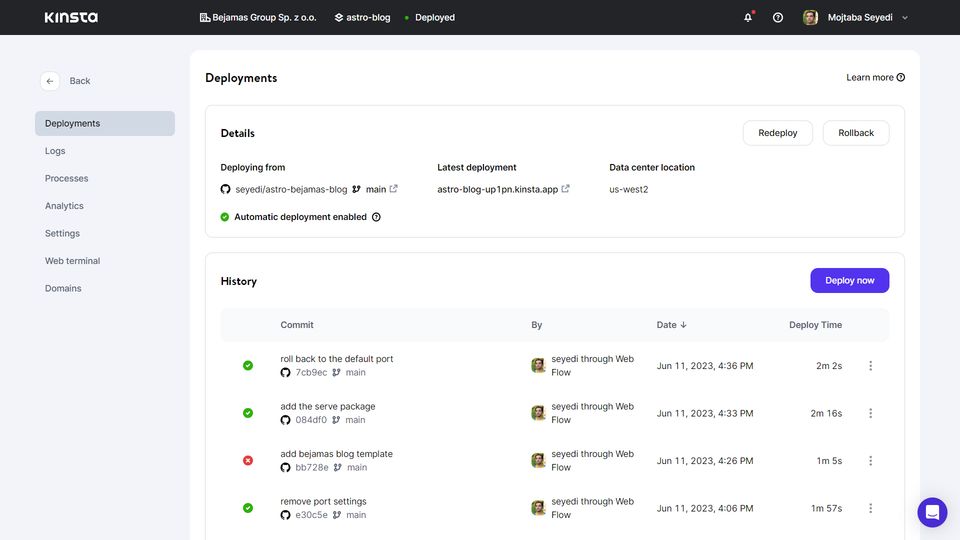
It consists of the following sections:
- Deployment: Easily track your deployment history, including branch details and commit numbers. You can even redeploy from previous commits if needed.
- Logs: Access and search server logs for the past 24 hours. Filter and sort logs by process or severity to quickly find the necessary information.
- Processes: Create and manage processes, and have control over your build machine's CPU and RAM settings.
- Analytics: Get insights into your app's performance over the last 24 hours. Monitor bandwidth usage, build time, runtime, CPU, and RAM usage to optimize your application.
- Settings: Edit basic app settings, configure Git branch settings, and set up environment variables.
Deployment
While awaiting the availability of static site hosting on Kinsta, you can use their Application Hosting to deploy your static sites. Once static site hosting services are implemented, you can expect even more efficient deployment and faster content delivery.
Deploying an application or website on Kinsta is a straightforward process that can be completed in a few simple steps.
First, choose the “Create an application” option on your dashboard:
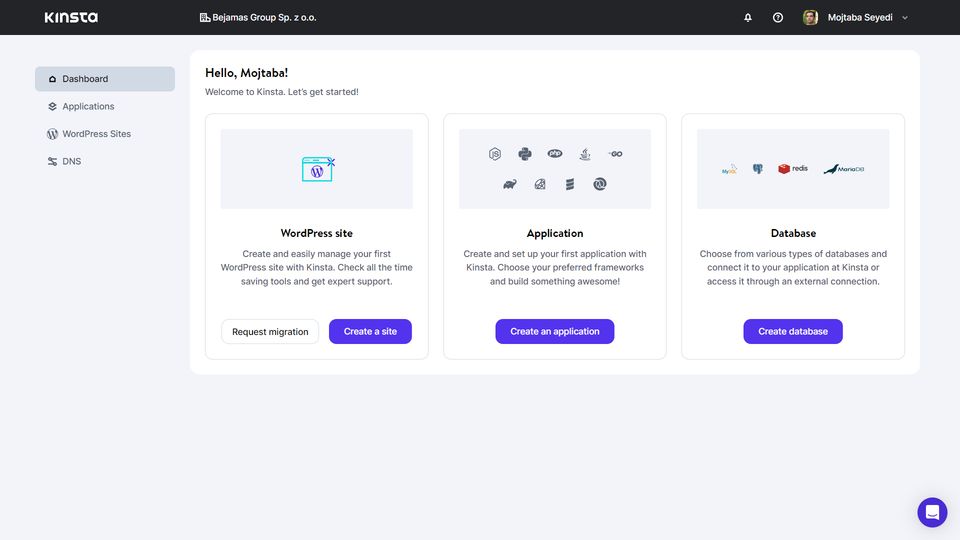
Connect your Git base repository to your project on Kinsta and select the desired branch:
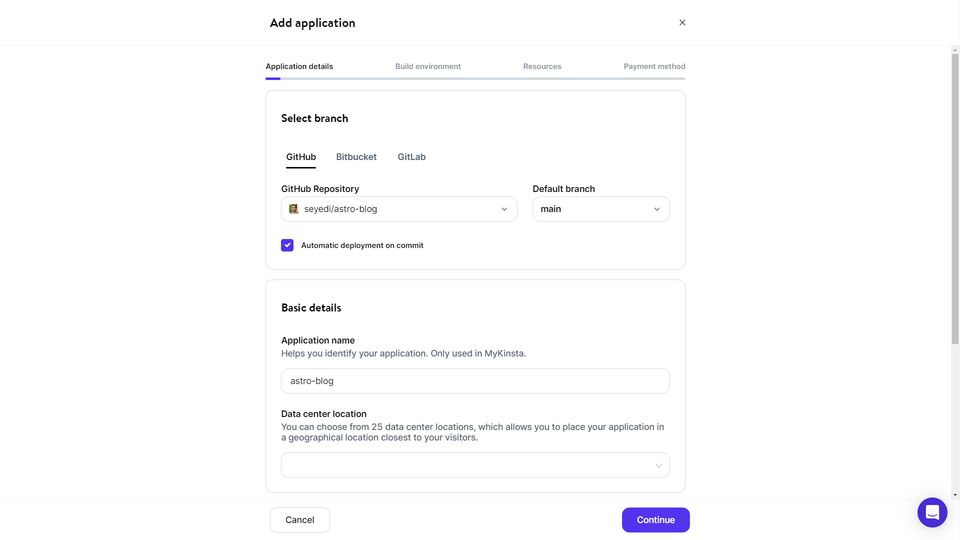
With Kinsta, you have the flexibility to deploy your application to any of their 25 data center locations. This ensures optimal performance and a reliable hosting environment for your projects:
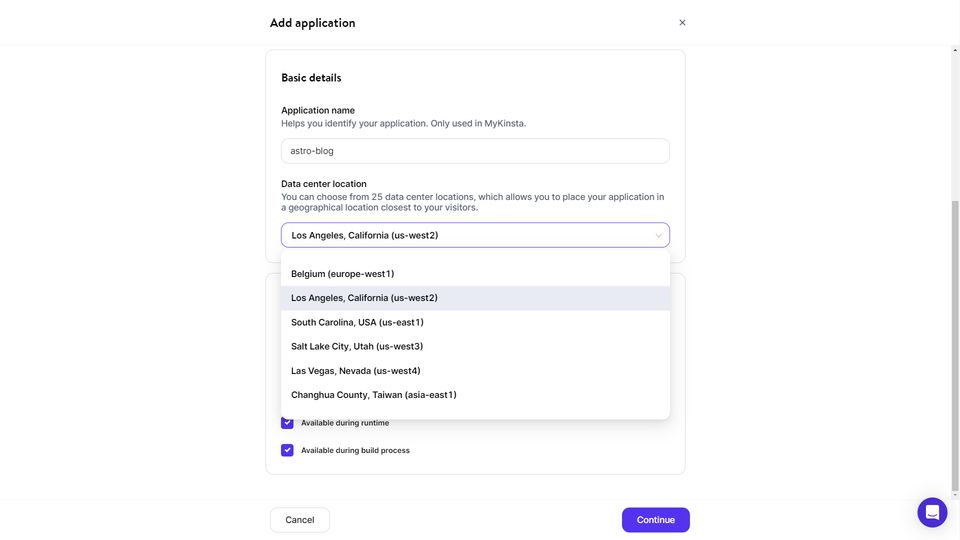
Then, you need to specify the resources you need for your project:
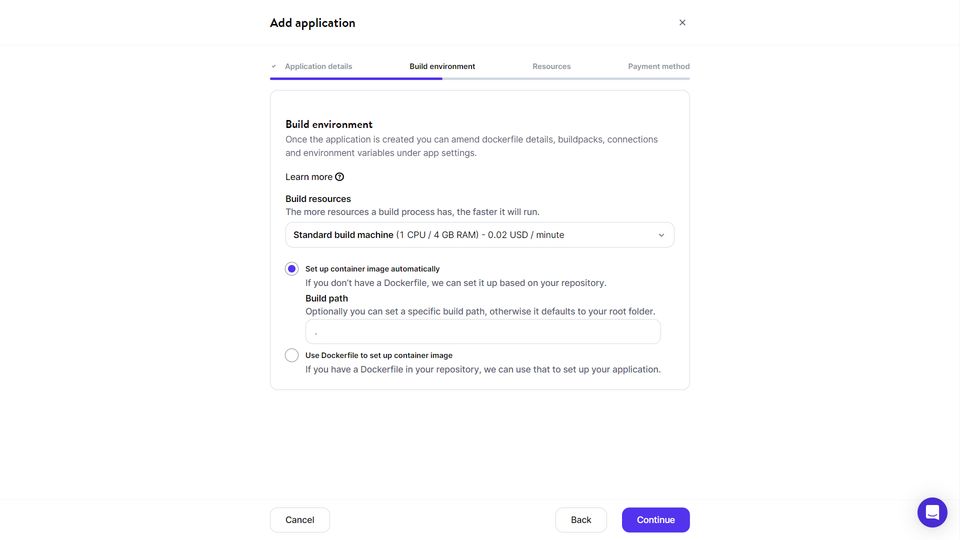
The next step allows you to set the resources for your processes. Also, you have the option to configure the start command. For most projects, you can leave it empty:
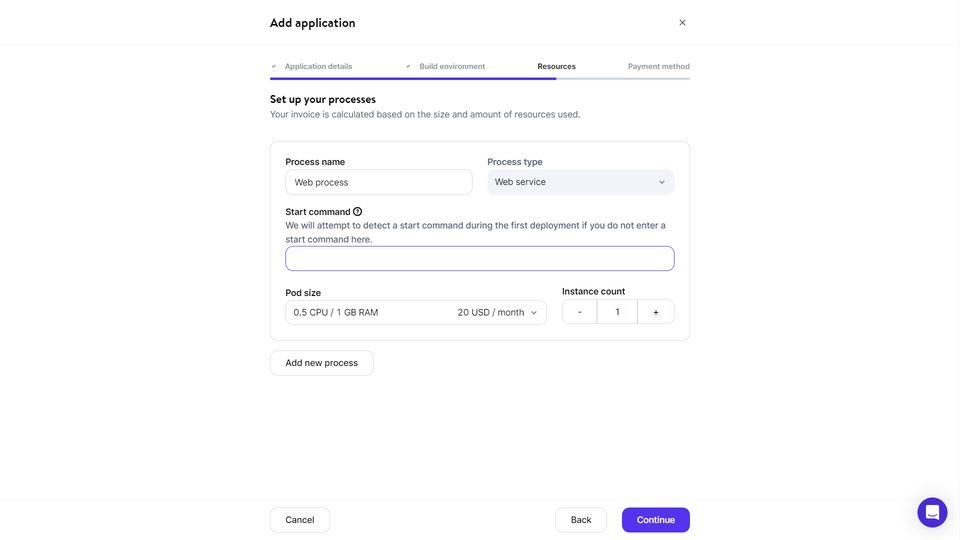
Finally, you can deploy your project either manually or automatically upon committing changes. Once deployed, you can easily access your website by using the link provided by Kinsta.
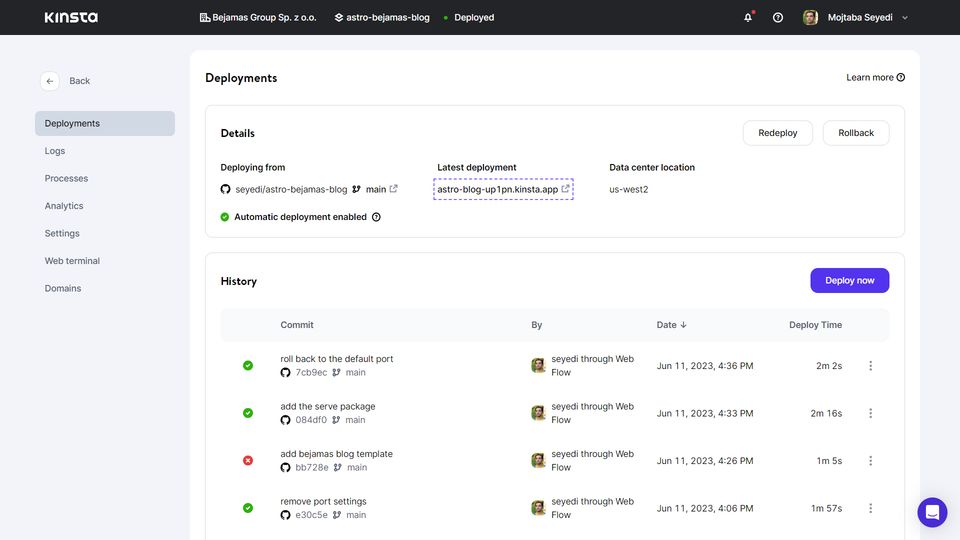
To further streamline the deployment process, Kinsta offers template repositories on GitHub. These templates support a variety of languages and frameworks, such as Astro, Eleventry, Qwik, Next, Nuxt, and more.
Deploying an Astro project to Kinsta
Let's take a real-world example and explore how we can deploy the Astro demo project that we created in our practical guide to Astro onto Kinsta.
Our project is already on GitHub, and its package.json file includes a name field and a build script. The only modification required is to add the serve package as a dependency and set the start script to serve dist/.
{
"name": "bejamas-astro",
"scripts": {
"dev": "astro dev",
"start": "serve dist/",
"build": "astro build",
"preview": "astro preview",
"astro": "astro"
},
"dependencies": {
"astro": "^2.0.1",
"serve": "^14.0.1"
}
}Now, we simply need to follow the steps we discussed in the deployment section to add our project to Kinsta. During the deployment process, Kinsta will automatically install the dependencies specified in the package.json file.
Kinsta Analytics
Kinsta provides analytics for all of your websites that include:
- Bandwidth: The amount of data transferred to and from your website.
- Data usage: The amount of storage space used by your website.
- Build time: The amount of time it takes to build your website.
- Runtime: The amount of time your website is running.
- CPU usage: The amount of CPU resources used by your website.
- Memory usage: The amount of memory resources used by your website.
- HTTP requests: The number of HTTP requests made to your website.
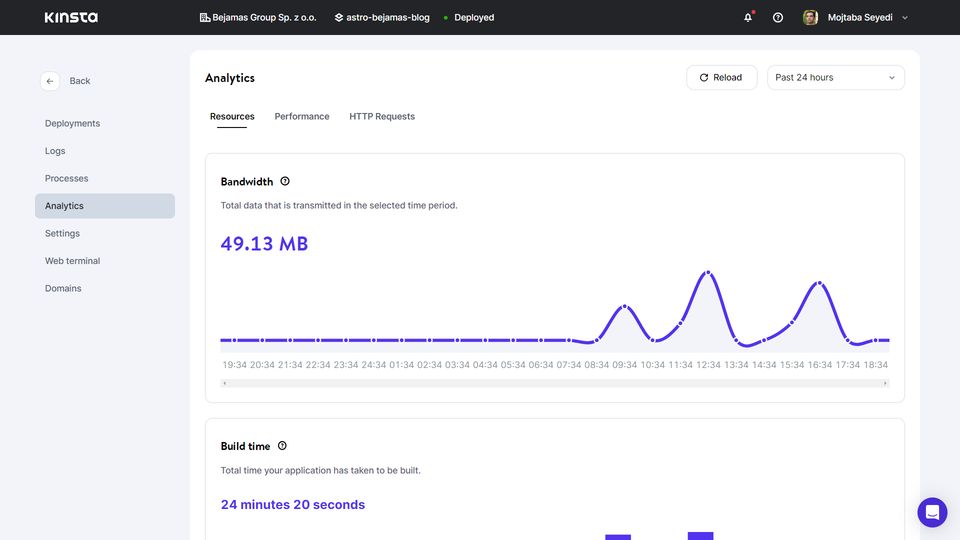
Kinsta analytics can be used to track website performance, identify potential issues, and optimize your site for better speed and performance. By understanding how your website is being used, you can make changes to improve its performance and make it more user-friendly.
Kinsta support
Kinsta's support team is always there to help you whenever you need it. They provide 24/7 chat support, ensuring prompt assistance for any issues you encounter during your development process. This reliable support is included with all their plans and services.
I personally experienced their amazing support when I had an issue on a Sunday. The support team invested considerable time and effort to fix the problem for me, showcasing their commitment to helping customers.
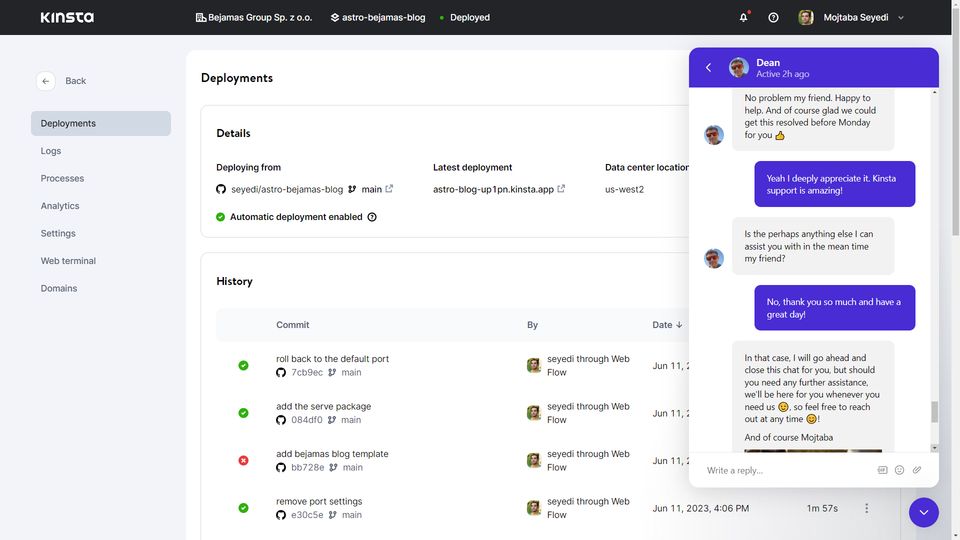
Conclusion
In conclusion, while Kinsta currently offers some support for Jamstack development, it is still in the early stages and lacks extensive features tailored specifically to Jamstack projects. However, they are actively working on improving their platform and plan to enhance their support for Jamstack soon. With their commitment to staying at the forefront of technology, Kinsta is expected to become a more suitable option for Jamstack developers in the coming updates.
Pros & Cons
| Kinsta | vs Pros | vs Cons |
|---|---|---|
Deploy fast straight from GitHub, GitLab, and Bitbucket | No CDN or caching functionality built into their application hosting | |
Automatic deployment on Commit | ||
Add databases | ||
No shared resources, unlimited builds | ||
Use favorite frameworks, languages, libraries | ||
Bring your own docker file | ||
Choose from 25+ data centers worldwide | ||
24/7 chat support |
 AWS Amplify
AWS Amplify Azure Static Web Apps
Azure Static Web Apps Begin
Begin Cloudflare Pages
Cloudflare Pages Deno Deploy
Deno Deploy Digital Ocean App Platform
Digital Ocean App Platform Firebase
Firebase GitHub Pages
GitHub Pages Heroku
Heroku Layer0
Layer0 Netlify
Netlify Render
Render Vercel
Vercel